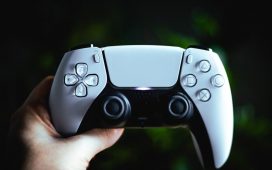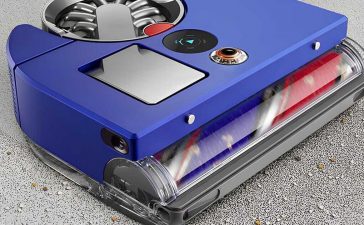I will have a review of the Apple Vision Pro when I’ve spent enough time with the new mixed reality headset. There’s a lot to unpack! But in the meantime, I want to highlight an app I just tried in my fifth (and longest experience) with the Apple Vision Pro: Algoriddim’s djay. I was told it would be the “spatial” Vision Pro app that blows my mind — and it did.
DJ enthusiasts will long be familiar with djay, a digital music mixing app that lets you mess with digital turntables, faders, and more. When the iPad launched in 2010, djay was one of the first apps to really take advantage of its large screen and multitouch. Now, Algoriddim’s hoping for another early hit on Apple Vision Pro, only instead of a touchscreen, you can interact with 3D turntables and faders by using hand-tracked gestures.
I am not a DJ and I can’t make music to save my life, but even I was impressed with the djay app. Using my voice, I asked Siri to “open the djay app.” The voice assistant appeared as a pulsing and swirling orb at the center of visionOS and then launched the djay app on command. Right away, two virtual turntables appeared in front of me, floating in my physical space. Like any 2D Vision Pro app, I could reposition the turntables by grabbing the little bar below it.
Behind me, several record albums floated in the air and curled to my left. I was instructed to grab one and then drop the vinyl onto one of the turntables. I did as told, “pushed” the start button, and the vinyl started spinning. From there I grabbed the needle and placed it on the record and then music started playing. It all felt very natural and real. Not real in the sense that the turntables looked photorealistic (they don’t), but more like instinctual to control. Vision Pro is clearly not for babies or kids, but I do think if it were, they’d instinctively reach out and touch, grab, and pinch virtual objects, the same way they instinctively reach out and touch and swipe on an iPad.
Later, I grabbed a fader and listened as the music flowed between the two built-in spatial audio speakers. My “holy sh*t” moment was when I added a second vinyl to the right turntable and then cupped my hand over my right ear and only heard sound from one side, as opposed to both. I’m told Algoriddim created a custom hand gesture for that. It was seriously cool.
If you’re reading all of this and thinking to yourself that it doesn’t sound like a big deal, then you need to expand your imagination. At that moment, as I cupped my hand to my ear, I saw the future — a reality where an aspiring DJ wouldn’t need to pay thousands of dollars to acquire physical mixing gear. They could just get an app, like djay, and probably pay an in-app fee to unlock and access more virtual gear add-ons. It’ll not only make something like DJ-ing more accessible but also more affordable. (Remember: $3,500 wouldn’t just be buying you turntable replacements, but several devices like a theater-sized projection screen or huge 4K TV, a surround sound speaker system, 4K monitor for a Mac, a 3D camera, and more.)
Yes, you don’t get any tactile feedback interacting with virtual objects, but you already don’t with an iPhone or iPad, and tons of DJs and audio engineers are making bangers with those devices. I’m also not saying that an app like djay used with Vision Pro will completely wipe out physical mixing equipment. There will always be a love for the tactile. But I do think when Vision Pro’s price comes down from $3,500, we’ll see there will be less of a need for tangible gear. We saw it happen when physical media went digital and standalone gadgets (cameras, music players, game consoles) were replaced by touchscreen-equipped smartphones and tablets. I’ll bet it happens again with Vision Pro and other head-mounted computers.
Look ahead, and you can probably see where I’m going with this. Mixed reality headsets have the potential to replace equipment for a ton of occupations and hobbies. Maybe spending $3,500 upfront to save on a few hundred dollars of DJ-ing equipment might be ridiculous, but if Vision Pro and a spatial app could, say, replace medical equipment in hospitals that are valued at tens of thousands of dollars if not millions? The cost savings would be well worth it. Maybe that’s a far off reality, but it’s one you can’t rule out.








